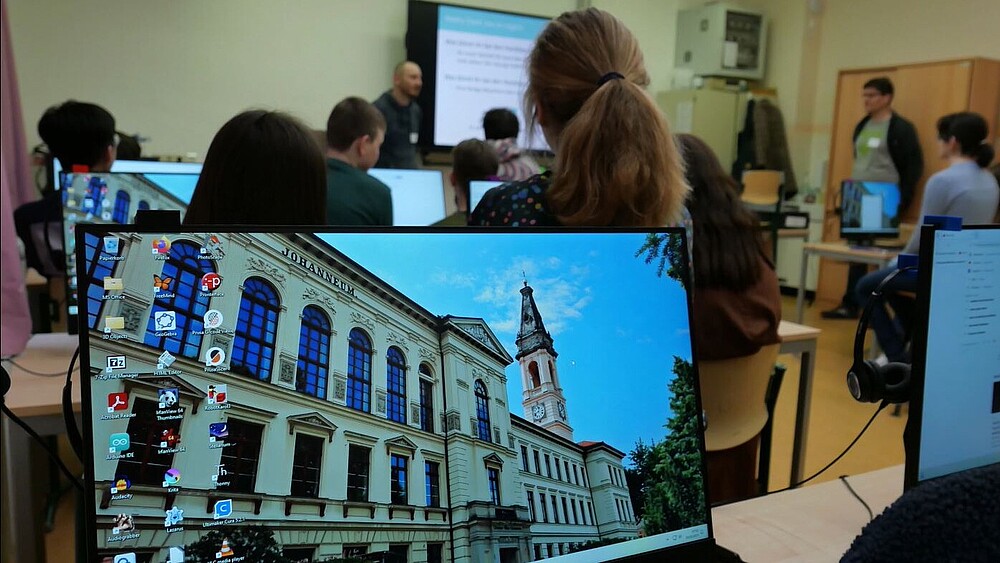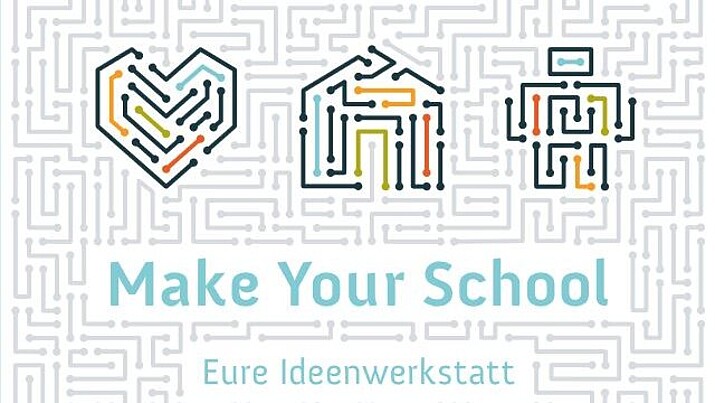With "Make Your School", the HSZG promotes STEM skills from Year 8 onwards.

"We're building a road salt truck for our school!" - With shining eyes and full of zest for action, five pupils announced this at the end of the first day of a very special project at Christian-Weise-Gymnasium Zittau. Together with their classmates, they had thought about how they could improve their everyday school life and wanted to put their ideas into practice straight away. Now they sat together and drew up a detailed list of materials so that their "hack", the construction of their prototype, could be successfully completed in just two more days before the presentation.
Three days of creative tinkering aimed at making the school a little better were met with enthusiasm by students and teachers alike. The Zittau/Görlitz University of Applied Sciences (HSZG) arrived with a special STEM suitcase set equipped with microcontrollers, sensors and output devices. For example, another group of students was able to measure the fill level of a waste bin and display it using an LED strip that changed from green to red when the bin was full. Another group built a sensor under a table that sounds an alarm when a piece of chewing gum is stuck to it.
These innovative suitcases come from "Make Your School", a nationwide network dedicated to promoting STEM skills (science, technology, engineering and mathematics). Make Your School offers pupils the opportunity to develop their skills in these important areas in practice-oriented projects and to develop innovative solutions for their everyday school life. The HSZG has been part of this network since this school year and holds five such "Hackday" events a year at schools in eastern Saxony, preferably with pupils in year 8.
One highlight was the HSZG's new mobile laboratory, which was developed as part of the "Future Learning Location Upper Lusatia" (ZukLOS). ZukLOS is at the heart of the promotion of extracurricular STEM education at the HSZG and aims to establish a future learning location for the entire region. "Today's children and young people are the future shapers of Upper Lusatia.With the Oberlausitz Future Learning Location, we are laying the foundation for them to actively take on this role," says Prof. Sophia Keil, Vice-Rector for Research, Transfer and Internationalization at the HSZG.
ZukLOS is divided into four fields of action: the Junior Academy Zittau, the Experimental House Görlitz, mobile and decentralized learning locations and Campus4You . The development of the mobile learning locations, which also include the mobile laboratory used here, aims to bring science and research directly to the people. With the digital technology on board, a laser cutter and a 3D printer, the students were able to give their prototypes an appealing design and even print the required components directly on site. The students were actively supported in the implementation of their ideas by dedicated university staff and Orest Lytvyn, who is completing his federal voluntary service at the HSZG.

The teachers involved were also enthusiastic about the project. Christian Pätzold, physics teacher, accompanied a group of pupils as they soldered and programmed an electronic room assignment (free/occupied). "It's fascinating to see how enthusiastic the pupils are about the project and how they acquire important skills in electronics and programming along the way," he praised. Anke Kindermann, computer science teacher, emphasized the practical application of programming with Arduino controllers.
The final presentation in the assembly hall was attended by the school management and teaching staff as well as pupils from Years 6 and 7, who will also benefit from Make Your School in the coming years. The groups presented their projects on stage and then showcased their results at "market stalls".
The successful day, on which 25 young inventors demonstrated their creativity and skills, ended with pizza and bright sunshine.
It was my first time organizing my own hackdays as a university. And it was a complete success! The eighth graders demonstrated six prototypes. Everyone got involved in the projects. I think it was a great experience for them and I can see similarities to the development and design profession. The engineering profession also has such successes in store when an idea takes off and starts to become reality.
”07-09.04.: Friedrich-Schleiermacher-Gymnasium Niesky
10-12.06.: Freie Oberschule Boxberg